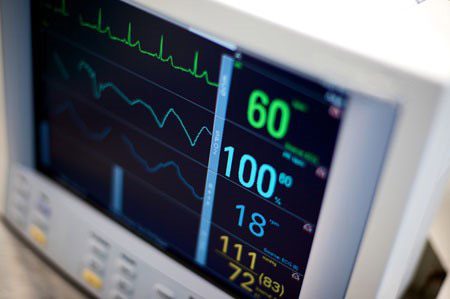We continue our series on Heart Health (during Heart Health month this February) today when we talk about Electrocardiograms (EKGs). So what does an EKG tell you? You may have heard about EKGs before, but wondered, what the heck is that test?
Heart Health Month
We’re going to break down some of the basics for you today.
What Does An EKG Tech do?
An Electrocardiogram (EKG or ECG) is a test that checks for problems with the electrical activity with a person’s heart. An EKG shows tracings on paper and those tracings represent the electrical activity of the heart. You may be wondering “electrical activity of the heart” what does that mean?! Well, think of the heart as a pump, it’s a muscular pump that consists of four chambers. The two upper chambers of the heart are atria and the two lower chambers of the heart are called ventricles. There is a natural electrical system within the heart that makes it contract and each time it contracts, blood pumps through the heart, the lungs, and throughout the rest of the body.
Why do people have EKGs?
As previously mentioned, an EKG is a test that measures heart health. It may be ordered for a patient by a healthcare professional for a number of reasons, including (but not limited to):
- Checking the electrical activity of the heart
- Trying to understand the cause of chest pain or pressure (which sometimes may be caused by a heart attack or angina)
- Identify the cause of symptoms of heart disease
- See if the walls of the heart are too thick
- See how medications are currently working and try to identify if they are affecting the heart
- See how medical devices (such as pacemakers) are working
- Check the general health of the heart when other diseases or conditions may be present (such as high blood pressure, high cholesterol, smoking, diabetes, a family history of heart disease, etc.).
What happens during and after an EKG?
Having any medical test or procedure can be a scary thing to think about at first, even if it’s routine or precautionary. It’s important to understand what to expect both during and after the test/procedure and that can often help set your mind at ease.

In total, an EKG will only take 5-10 minutes on average. Here’s what you can expect during an EKG:
- Patients will be asked to lie on a table or a bed.
- Certain areas of the patient’s body (arms, legs, and chest) where the electrodes will be placed will be cleaned (and possibly shaved).
- The healthcare professional facilitating the test will place electrodes on the patient’s body (as previously noted, on the patient’s arms, legs, and chest). The electrodes measure the electrical activity of the heart. The electrical activity is recorded as traces on paper from the test.
- During the test, the healthcare professional administering the test may ask the patient not to talk, lie very still, and breathe normally. Sometimes patients may also be asked to hold their breath during the test.
- After the test, the electrodes are removed from the patient and the electrode paste is wiped off the patient.
At the conclusion of the EKG, a doctor will read and interpret the patient’s results from the test. In reading the test, the doctor will look at the pattern of spikes and dips (from the traces on the paper) to check the electrical activity from different areas of the heart. The spikes and dips are grouped in sections to show how the heart is working.
We’ve included a helpful chart here from our friends at WebMD that explains how the results of an EKG are interpreted.
Medical Training Programs at Dorsey Schools
The Medical Training programs Dorsey Schools offers are designed to help prepare students for exciting new careers in allied health! Students enrolled in these programs can benefit from hands-on training that takes place in a traditional classroom environment as well as in the labs on campus. Students in select Medical Training programs offered at Dorsey Schools may also benefit from an externship, which takes place during the final module of training, where they can apply the skills and knowledge learned throughout their program in an actual occupational setting.
Several of the Medical Training programs offered at Dorsey Schools include instruction on EKGs, including:
- Medical Assistant Training Program
- Patient Care Technician Program
- Dialysis Patient Care Technician Program
If you’d like to learn more about the Medical Training programs offered at Dorsey Schools, you can give us a call at 888-422-1188 or request info online.
For more information about our graduation rates, the median debt of students who have completed the program, and other important information, please visit www.dorsey.edu/disclosures.
Sources:

